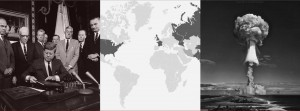Marshall Islands’ Nuclear Disarmament Cases to be Heard by International Court of Justice
On Monday, March 7th, the International Court of Justice (ICJ) will begin hearings in The Hague, Netherlands, on the preliminary objections raised by the United Kingdom (U.K.), India and Pakistan in the nuclear disarmament cases brought by the Republic of the Marshall Islands (RMI). The Court will determine whether any legal obstacles prevent the cases from going forward to consideration of the merits.
On April 24, 2014, the RMI filed the unprecedented lawsuits before the ICJ. They aim to hold the nine nuclear-armed states — the United States, U.K., Russia, France, China, Israel, India, Pakistan and North Korea — accountable for violating international law by failing to respect their nuclear disarmament obligations under the 1968 Nuclear Non-Proliferation Treaty and customary international law.
From 1946 to 1958, the Marshall Islands, a tiny island nation in the Pacific, was used by the United States as a nuclear bomb testing area. During the 12-year period, 67 nuclear weapons were detonated. In 1954 the U.S. detonated “Castle Bravo,” a nuclear bomb 1,000 times greater than the bomb that destroyed the city of Hiroshima, Japan. The health, environment and culture of the people have been harmed, and continue to be harmed, by the tests.
Tony de Brum, former Marshall Islands Foreign Minister and Co-Agent in the cases, said, “I have seen with my very own eyes nuclear devastation and know with conviction that nuclear weapons must never again be visited upon humanity. Nuclear weapons are a senseless threat to survival and there are basic norms that compel those who possess them to pursue and achieve their elimination. This is the subject of legal action by my country at the International Court of Justice.”
Because they accept the compulsory jurisdiction of the ICJ, the U.K., India and Pakistan are appearing before the Court this week. The other countries, the United States, China, Russia, France, Israel and North Korea, have chosen to ignore the cases.
The U.K. case differs from the cases against India and Pakistan in that the U.K. is a party to the Nuclear Non-Proliferation Treaty and is, therefore, bound by Article VI which requires states to pursue negotiations “in good faith” to end the nuclear arms race and achieve total nuclear disarmament. The Marshall Islands contends that India and Pakistan are bound by similar obligations under customary international law.
Phon van den Biesen, an Amsterdam attorney and Co-Agent for the RMI, is leading the international legal team. He said, “From a legal perspective, the issues presented by these cases are ordinary ones, but a positive outcome will, spectacularly, change the world. We are, basically, asking the Court to tell the respondent states to live up to their obligations under international law and to conduct negotiations leading to the required result: nuclear disarmament in all its aspects.”
The Republic of the Marshall Islands is asking the ICJ to follow up on its twenty-year old Advisory Opinion findings about the illegality of the threat or use of nuclear weapons. In 1996, the Court considered that the continued international debate on the legality of these deadly weapons threatens the stability of the international order. It added that “the long-promised complete nuclear disarmament appears to be the most appropriate means” to put an end to that untenable situation. See para. 98 at http://www.icj-cij.org/docket/files/95/7646.pdf
World leaders, international non-governmental organizations, world-class experts and Nobel Peace Laureates have offered strong support for the cases, denouncing nuclear weapons as immoral and illegal. http://nuclearzero.org/#lastone
For more information and to receive daily ICJ reports, please visit the California-based Nuclear Age Peace Foundation at https://www.wagingpeace.org/
















Comments
No comments so far.